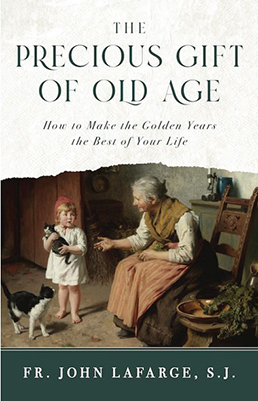Fr. LaFarge’s ‘The Precious Gift of Old Age’ is a valuable read for all stages of life

Reviewed by Katie Faley
One of the things that I love most about my home parish, St. Mark in Peoria, is that it’s truly a community for the ages. Everybody belongs at St. Mark’s. Young families, college students, young adults like me, and the older people who have spent the majority of their lives (and in some cases, all of their lives!) at St. Mark’s.
Each life stage is so valuable. And that is precisely the point that Father John LaFarge, SJ, author of “The Precious Gift of Old Age,” makes in his book.
Originally published in 1963, Sophia Press has re-published this 100-page treatise on the value of old age in 2022.
But why would someone in her 20s want to read a book on “how to make the golden years the best of your life”?
This is not just a how-to guide for the elderly. There are nuggets of wisdom that any age can glean. It can be just as relevant for someone who’s 27 as it is for someone who’s 87.
For as long as I can remember, my parents have lived out a concrete example of what it means to value old age. From regularly taking us as children to visit my deceased grandparents’ graves, to caring for elderly neighbors, to welcoming my grandpa into our home when he could no longer physically take care of himself and taking care of his every need until the hour he died. It’s no wonder I was intrigued by this type of title.
However, after finishing this book I would point out it’s not just a how-to guide for the elderly. There were many nuggets of wisdom that any age can glean. And I think that’s the essence of “The Precious Gift of Old Age”: it’s timeless. A book that was first published in 1963 can be just as relevant in 2022. And it can be just as relevant for someone who’s 27 as it is for someone who’s 87.
WHAT WE GAIN IN OLD AGE
The book is divided into five parts, with Father Lafarge asking the question, “What do we gain in old age?” In our image-controlled world, we often consider all the things that we lose in old age. But Father Lafarge maps out all that we gain.
The first part examines the principle of growth through diminishment. In order to gain something good, sometimes we have to lose some good things. We see this in the design of the world. Farmers know that good crops come from soil where something died before. In old age, some things of youth might be lost — like energy — but what is left is a much deeper wisdom and understanding of life.
The second part focuses on hope. Hope changes people. Father Lafarge suggests that hope is something much deeper than just a good mood or positive attitude. Hope is a certainty of good, which we can be guaranteed because Jesus showed us true hope in the Resurrection.
The third section is about the power of love in old age. Because of the life experience of the elderly, the older generations have a unique and deep ability to genuinely love — and that’s more powerful than the energy of youth. For this fact, we young people need to return to a respect and reverence for old age. In our modern culture, this is something we’ve lost. We no longer rely on our local community for cultural, economic, political and social outlets. Our world is more connected now than ever before, yet we’re still lonely. We all need to go out of our way to build a community where the young can seek advice from the old and the old can find companionship with the young.
VALUING THE ELDERLY
The fourth part describes society’s responsibility toward the old. Though this is for everyone, it’s especially pertinent to younger generations. It’s our duty to fight against the injustices that the elderly face in society. It’s our duty to not buy into “throwaway” culture and make sure that the elderly are valued for all the good that they have to contribute to society. These themes and others were raised by Pope Francis in a series of general audience talks this summer.
Finally, the fifth part pays tribute to the courage that old age can require. We all need to turn to strong faith in God. A quote that Father Lafarge writes sums it up, and it’s one for the ages: “There is no mistake, no error, however radical and disastrous, however much shame and guilt it may have brought into our lives, that cannot be repaired by the healing power of that new life that is promised for our future.”
I will be returning to this book as I grow older and older, gleaning different insights in different ages.
—
KATIE FALEY is a member of St. Mark Parish in Peoria, a writing coordinator for OSF HealthCare, and regular columnist for The Catholic Post. She has a master’s degree in theology and theological studies from the University of Notre Dame. Write to her at katiefaleywriter@gmail.com.






